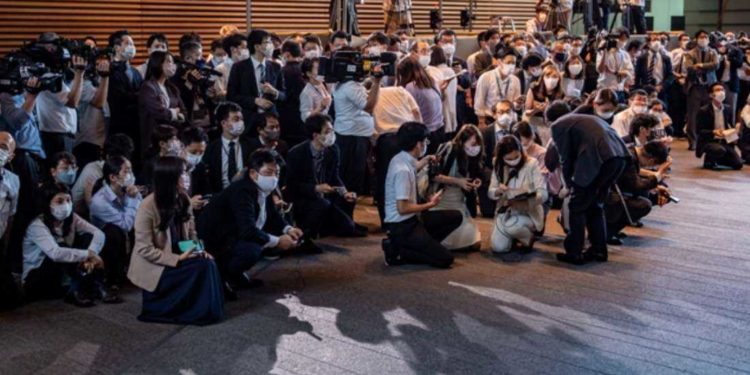By not throwing light on the Colabo scandal, Japanese media is not only enabling it but allowing it to thrive
Journalists gather for a media huddle at the Japanese prime minister’s office in Tokyo on Oct. 4, 2021. (Photo: AFP)
When we can no longer trust our media then we are on the brink of a totalitarian state.
That the Japanese public has grown disillusioned with the media’s reluctance to cover important stories is now an undisputed truth as we have shown in our previous stories, When religion is business in Japan and When charity becomes business in Japan.
Many feel that the mainstream media is more concerned with preserving its relationships with powerful figures and institutions, rather than fulfilling its role as a watchdog and holding them accountable.


The recent scandal about the arrest of an NPO (non-profit organization) founder and the shady business of an organization called Colabo is spreading like wildfire in Japan, but the vast firestorms can only be seen on Twitter.
The Colabo story is very crucial as it highlights a core truth of these times — there are no more institutional watchdogs but only volunteer “stray dogs” that have been digging up the dirt that used to be the bread of genuine investigating journalism.
One of these volunteers goes under the Twitter handle name @himasoraakane. He defines himself as Amazon Associate Program Participant and claims the Colabo organization, which is publicly funded, was misusing its resources.
“One of the accusations is that this organization is using the funds for political purposes”
He requested official documents, scrutinized their activity to check for any malfeasances and posted the results on his blog. This is something every taxpayer should be concerned about since our collective resources are possibly being misused here.
As the sun rises over the coast of Japan, this lone citizen sits at his desk, going over documents and piecing together the latest puzzle in his ongoing ‘private’ investigation. For months he has dedicated himself to digging up the truth about this organization’s misuse of public funds, and he apparently had also other Twitter users helping him in his quest.
They actually hit the streets to dig deep to uncover the facts, for example, they took pictures of the tires of the car used by the Colabo in order to prove that they haven’t changed it as often as they claim in official documents.
This blogger-turned-investigative journalist sent an audit request to the Tokyo Metropolitan Government to look into Colabo’s books: unfair accounting, fraudulent receipt of public assistance, and violation of the Public Offices Election Law. The request was sent in early November, and in doing so he has also started fundraising which reached an astounding 63 million yen (US$481,200).
One of the accusations is that this organization is using the funds for political purposes, for example, bringing the women the organization is supposed to help to increase the number of participants in specific political protests, like against the American military base in Okinawa (in their defense the organization claimed the girls themselves asked to come along).
On Nov. 29, the head of the Colabo organization filed a lawsuit against Mr. Himasora (the twitter name), accusing him of spreading false rumors and slandering him.
“It is not productive or fair to deflect responsibility by claiming victimhood or making accusations of misogyny”
As we are waiting for the result of the audit we have a quote from attorney, Hajime Kanbara, who is part of the Colabo defense team, saying: “Its cyber harassment that damages the credibility by building up false rumors. It’s essentially discrimination against women by people who are against women’s rights.”
Now, how ridiculous is that?
It’s understandable that being accused of something illegal may leave one upset whether guilty or not, but it is not productive or fair to deflect responsibility by claiming victimhood or making accusations of misogyny like it has been done in this case. And, for an attorney, not being able to respond properly sounds almost like an involuntary admission of guilt.
If someone criticizes my arguments it would be very unwise of me, to say the least, to point out their “biological bias” and blame it on their being of a specific gender. Their sex has nothing to do with the matter in discussion.
But there is one conclusion that can be drawn here.
As the media plays a crucial role in holding those in power accountable and ensuring transparency in government, and by not bringing these issues to light, the media is not only enabling corruption but allowing it to thrive.
There are several reasons why the Japanese media may be guilty of this. It is possible that they are not thoroughly investigating and reporting on these issues due to pressures from the government or other powerful entities.
As the latest Twitter files in the United States have shown, the Federal Bureau of Investigation (FBI) and several other government agencies were directing — even paying the old Twitter, before the Elon Musk acquisition — to comply with their requests to take down accounts of independent journalists, scientists, executives, and individuals who said things that they simply didn’t like.
If this is also the case in Japan we may soon know the truth.
*The views expressed in this article are those of the author and do not necessarily reflect the official editorial position of UCA News.
Latest News
Credit: Source link




